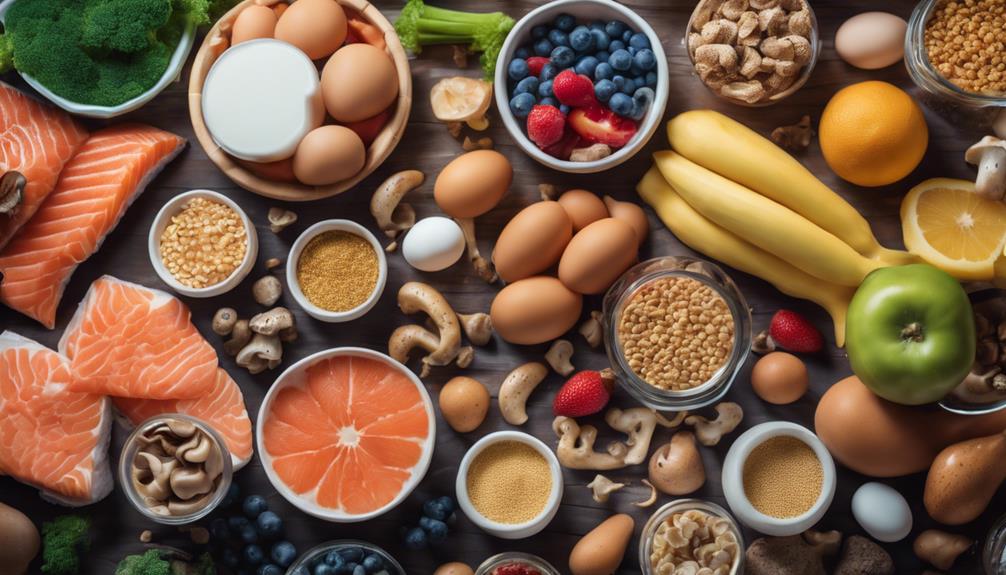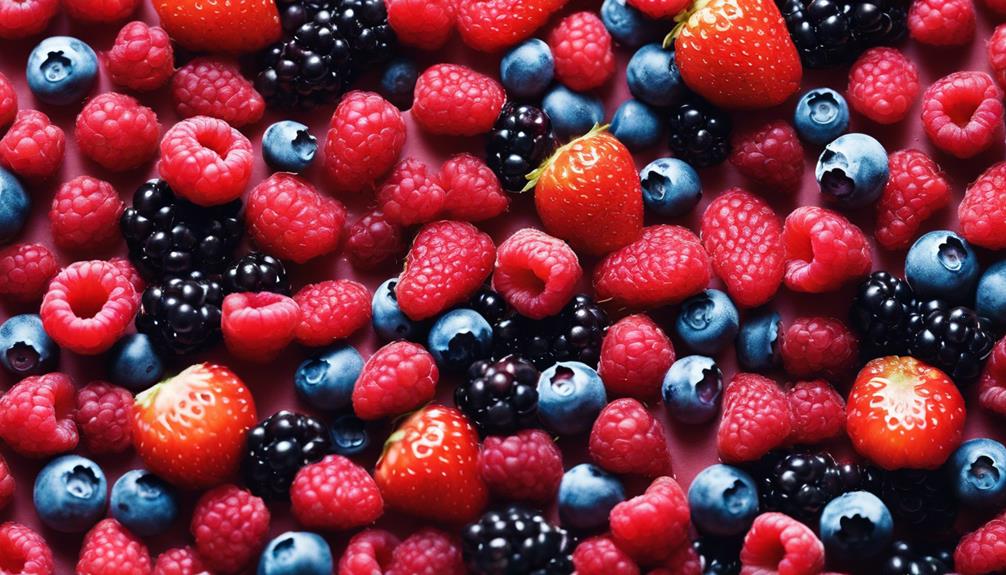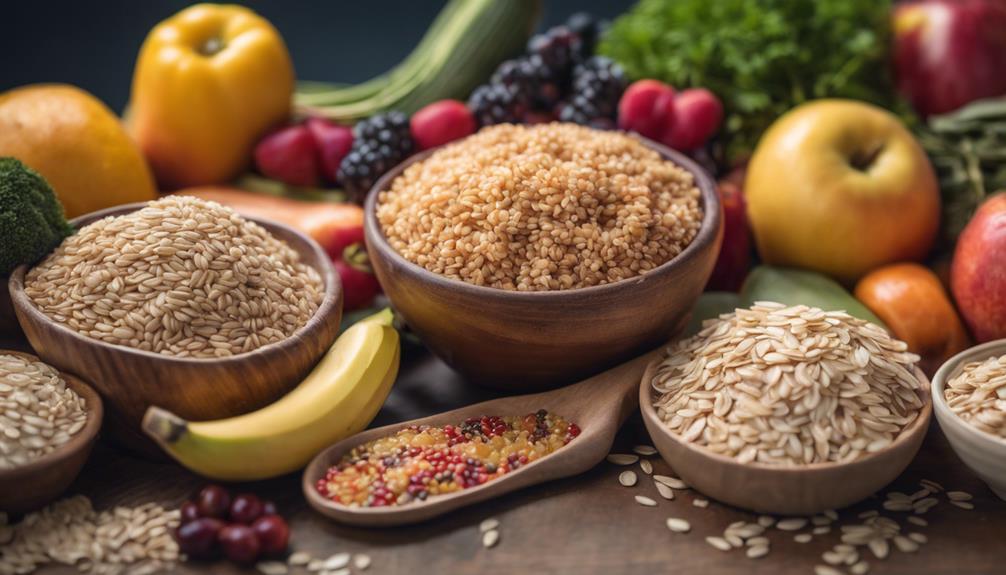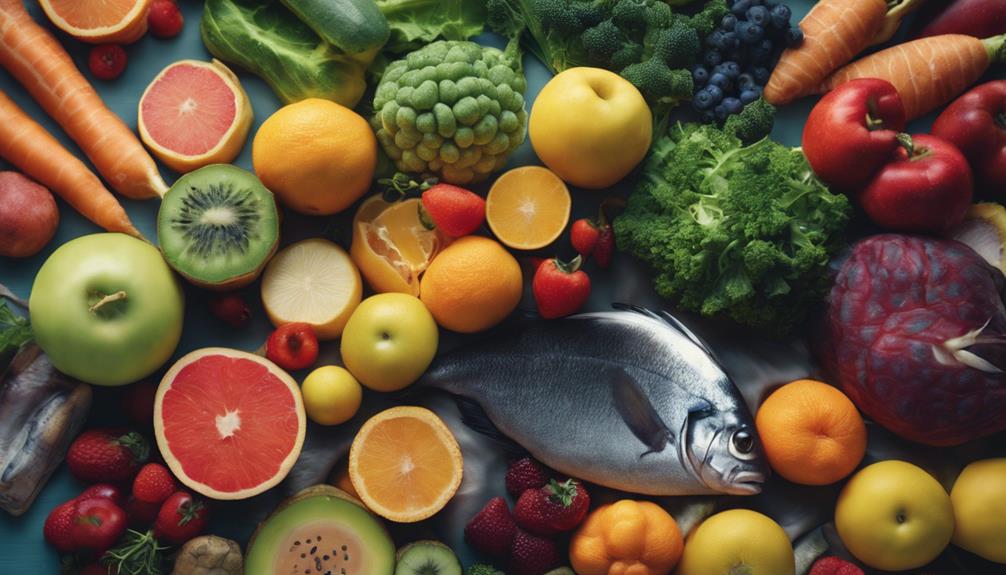To optimize your baby’s brain growth, include Omega-3 fatty acids from salmon and mackerel in their diet for cognitive development. Make sure to incorporate iron-rich foods such as pureed meats and fortified cereals to support cognitive function. Eggs, a good source of choline, aid in memory formation and neurotransmitter production. Additionally, Vitamin D-rich foods are crucial for cognitive function and brain development. Antioxidant-rich fruits help protect brain cells, and lean proteins like pureed meats provide essential nutrients like iron and zinc for healthy brain development. Don’t forget to include leafy green vegetables, berries, citrus fruits, and dairy alternatives in your baby’s diet to ensure optimal brain growth. Remember, your baby’s brain health should be a top priority.
Key Takeaways
- Omega-3 fatty acids like DHA in salmon support fetal brain development.
- Iron-rich foods like pureed meats aid cognitive function and learning abilities.
- Choline from eggs enhances memory formation and brain development.
- Vitamin D-rich foods optimize brain development and cognitive function.
- Antioxidant-rich fruits and lean proteins boost brain growth and function.
Omega-3 Fatty Acids
Including omega-3 fatty acids in your baby's diet is essential for excellent brain development. These essential nutrients, especially DHA, play a significant role in fetal brain, eye, and nervous system development.
Sources like fatty fish, such as salmon and mackerel, are rich in omega-3 fatty acids, making them beneficial additions to your baby's meals.
Consuming omega-3 fatty acids during pregnancy can also support your baby's brain development, laying a strong foundation for their cognitive growth. Studies have shown that adequate intake of omega-3s can even lower the risk of developmental delays in infants, highlighting the importance of incorporating these nutrients into your baby's diet from an early age.
Iron-Rich Foods

Iron-rich foods play an essential role in supporting baby brain development by providing necessary nutrients for excellent cognitive function and learning abilities. The baby's brain requires iron to guarantee healthy growth and function. Iron deficiency in infants can lead to developmental delays and behavioral issues, emphasizing the importance of incorporating iron-rich foods into their diet.
Sources such as pureed meats, fortified cereals, and beans are excellent choices to introduce when starting solids. Iron assists in carrying oxygen to the brain, which is essential for ideal brain function and overall cognitive development in babies. Making sure a sufficient intake of iron-rich foods from an early age is critical for promoting proper brain growth and function in infants.
Choline Sources

Support your baby's brain development by introducing choline-rich foods like eggs into their diet. Choline is an essential nutrient that plays a significant role in brain development, particularly in memory formation and cognitive function in infants.
Eggs, being an excellent source of choline, can support excellent brain growth in your baby. This nutrient is necessary for the production of neurotransmitters, which are essential for brain communication and function.
By ensuring that your baby receives sufficient choline during their infancy, you're setting the stage for long-term benefits in brain health and cognitive abilities. Incorporating choline-rich foods like eggs into your baby's diet can help provide the necessary building blocks for a healthy and developing brain.
Vitamin D-Rich Foods

Vitamin D plays an essential role in supporting your baby's brain development. Sources rich in Vitamin D such as fortified dairy products, fatty fish, and egg yolks are vital additions to your little one's diet.
Ensuring adequate intake of Vitamin D can help boost cognitive function and lower the risk of developmental delays.
Essential for Brain Growth
Incorporating foods rich in Vitamin D into your baby's diet is essential for ideal brain growth and development. Vitamin D plays an important role in supporting brain function, making it a key nutrient for new parents to prioritize.
Here are some key reasons why Vitamin D is essential for your baby's brain growth:
- Supports Cognitive Function: Foods rich in Vitamin D, such as fatty fish and fortified dairy products, have been shown to support cognitive function in infants, aiding in learning and memory development.
- Long-Term Brain Health Benefits: Adequate intake of Vitamin D during infancy can have long-term benefits for brain health, potentially reducing the risk of cognitive impairments later in life.
- Prevents Developmental Delays: Vitamin D deficiency in babies can lead to developmental delays and hinder optimal brain growth, highlighting the importance of including Vitamin D-rich foods in their diet.
- Optimizes Brain Development: Including Vitamin D-rich foods in your baby's meals can help optimize their brain development, setting a strong foundation for future learning and cognitive abilities.
Sources of Vitamin D
For ideal brain development in your baby, consider the various sources of Vitamin D, which are essential for supporting healthy growth and cognitive function.
Fatty fish like salmon and mackerel are excellent options as they provide a significant amount of Vitamin D, essential for your baby's brain development.
Additionally, fortified foods such as cow's milk, soy milk, and orange juice can be good sources of Vitamin D for infants who mightn't get enough sunlight exposure.
Remember that exposure to sunlight helps the body produce Vitamin D, which is important for healthy brain function in babies.
Vitamin D also plays a role in regulating calcium and phosphorus levels, important for bone development in infants.
The American Academy of Pediatrics recommends ensuring that your baby receives adequate Vitamin D through sources like breast milk, fortified foods, and safe sun exposure to support their overall growth and development, including brain health.
Antioxidant-Rich Fruits

Antioxidant-rich fruits like berries and citrus fruits play an important role in supporting your baby's brain development.
Berries are known to reduce inflammation in the brain, enhancing cognitive function and memory.
Citrus fruits contain antioxidants that promote better communication between brain cells, ensuring excellent brain health for your little one.
Berry Brain Boost
Berries, being rich in antioxidants, play a significant role in boosting brain function and development in babies. Here are some ways berries benefit your baby's brain:
- Reducing Inflammation: The antioxidants in berries help reduce inflammation in the brain, creating a healthier environment for neural connections to thrive.
- Improving Communication: Antioxidants found in berries enhance communication between brain cells, aiding in the smooth transmission of information.
- Enhancing Memory: By consuming berries, babies can experience improved memory retention and cognitive function, supporting their overall brain health.
- Sweet Natural Snack: Berries aren't only delicious but also a convenient and natural snack option that provides essential brain-boosting benefits for your little one.
Citrus Cognitive Support
Citrus fruits, rich in antioxidants, provide essential support for cognitive function and brain health in babies and children. Oranges, lemons, and grapefruits are packed with vitamin C, a powerful antioxidant that helps shield brain cells from free radical damage.
The presence of folate in citrus fruits further enhances their cognitive benefits. Folate, a B-vitamin, is vital for brain development and function in young ones. By incorporating citrus fruits into your child's diet, you aren't only offering a delicious treat but also aiding in memory enhancement, focus improvement, and overall brain health.
The regular intake of these antioxidant-rich fruits can contribute significantly to your child's optimal brain development and cognitive abilities. Including a variety of citrus fruits in your little one's meals ensures they receive a diverse range of nutrients that support their growing brain and cognitive functions.
Make citrus fruits a staple in your child's diet for a brain boost that tastes as good as it benefits.
Whole Grains

Rich in nutrients essential for brain development, whole grains play an important role in supporting the cognitive function of your baby.
When it comes to your little one's brain health, incorporating whole grains into their diet can provide a variety of benefits:
- Nutrient-Rich: Whole grains like brown rice and whole grain bread are packed with important nutrients such as B vitamins, iron, and fiber, which are essential for your baby's brain development.
- Cognitive Support: Introducing whole grains early on can help support cognitive function and overall brain health in infants and toddlers.
- Energy Source: Foods like oatmeal and whole grain bread offer sustained energy, perfect for the growing brains of your little munchkin.
- Memory and Learning: The essential nutrients found in whole grains can aid in memory retention, focus, and learning abilities, contributing to your baby's overall cognitive development.
Lean Protein Sources

When considering your baby's brain development, turning to lean protein sources like pureed meats becomes essential due to their rich iron and zinc content. Iron plays a critical role in supporting healthy brain development and helps prevent cognitive delays in infants.
Additionally, zinc from lean protein sources is crucial for memory and attention in young children. By including lean protein sources in your baby's diet, you can enhance their long-term cognitive function and overall brain health.
Pureed meats are particularly beneficial as they're easy for babies to digest and provide high-quality protein necessary for ideal brain development. Ensuring your baby receives adequate amounts of lean protein sources like pureed meats can contribute significantly to their cognitive growth and well-being.
Incorporating these nutrient-rich foods into your baby's meals early on can lay a strong foundation for their brain development and future cognitive abilities.
Leafy Green Vegetables

Consider incorporating leafy green vegetables like spinach and kale into your baby's diet to support their brain development. These nutrient-packed greens offer a plethora of benefits important for cognitive function and memory.
Here are four reasons why leafy greens are essential for your little one's brain development:
- Rich in Antioxidants: Spinach, kale, and broccoli are loaded with antioxidants that help protect brain cells from damage and support overall brain health.
- Vitamins and Minerals: Leafy greens provide essential vitamins and minerals like vitamin K, vitamin A, and iron, which are necessary for proper brain function and development.
- Folate for Brain Development: Folate, abundant in leafy greens, plays a pivotal role in brain development and can aid in preventing neural tube defects in infants.
- Promotes Gut Health: The fiber content in leafy greens supports a healthy gut, which is closely linked to brain development and overall well-being.
Incorporating a variety of leafy greens in your baby's diet can promote optimal brain growth and function.
Berries and Citrus Fruits

Incorporate a variety of berries and citrus fruits into your baby's diet to further support their brain development.
Berries such as blueberries, strawberries, and raspberries, along with citrus fruits like oranges, lemons, and grapefruits, are packed with antioxidants that play an important role in reducing inflammation in the brain.
These fruits also contain essential nutrients like Vitamin C, Vitamin K, and fiber, which promote efficient communication between brain cells and support overall brain function in babies.
By including berries and citrus fruits in your baby's diet, you can enhance their memory retention and cognitive abilities while providing a natural source of sweetness that appeals to their taste buds.
The diverse array of nutrients found in these fruits contributes to healthy brain development, making them an excellent addition to your baby's meals.
Dairy and Alternatives

You can enhance your baby's brain development by including dairy products and alternatives in their diet. Here are some key points to keep in mind:
- Dairy Benefits:
Dairy products like yogurt and cheese are excellent choices for children as they're rich in protein and calcium. These nutrients are essential for supporting brain growth and development in infants.
- Greek Yogurt:
Specifically, Greek yogurt is a valuable source of protein and calcium, important for brain growth and gut health in babies. Its creamy texture and versatility make it a popular choice for young ones.
- Dairy Alternatives:
Fortified plant-based milks offer a suitable alternative for those who can't consume dairy. These alternatives can also provide essential nutrients necessary for brain development in infants and toddlers.
- Overall Nutrition:
Including dairy or alternatives in your child's diet can greatly contribute to their overall nutrition and growth during the critical early years. Parents can easily incorporate these options into meals and snacks to support their baby's brain development.
Frequently Asked Questions
Which Food Increases Baby Brain Development?
To boost baby brain development, include fatty fish like salmon, eggs for choline, Greek yogurt for protein, and berries with antioxidants. Don't forget oats for fiber and iron. These foods are essential for your little one's growing brain.
What Are the Top 5 Brain Foods?
To boost your baby's brain development, focus on fatty fish like salmon, eggs for choline, Greek yogurt for protein, and berries packed with antioxidants. Oats with fiber and iron support healthy growth.
What Foods Boost Children's Brain?
You might think it's tricky, but feeding your child brain-boosting foods is easier than you imagine. Try fatty fish for omega-3, eggs for choline, Greek yogurt for probiotics, berries for antioxidants, and oats for fiber.
How Can I Speed up My Baby's Brain Development?
To speed up your baby's brain development, focus on providing a balanced diet rich in omega-3 fatty acids, DHA, antioxidants, and iron. Incorporate foods like fatty fish, eggs, berries, Greek yogurt, oats, and make sure exposure to music.
Conclusion
In the journey of nurturing your baby's brain development, think of these foods as the building blocks for a strong foundation.
Just as a skilled architect carefully selects the best materials for a sturdy structure, you can choose the best foods to support your baby's growing mind.
By incorporating omega-3 fatty acids, iron-rich foods, choline sources, and more into their diet, you're laying the groundwork for a bright future ahead.
Choose wisely, and watch your little one thrive.










